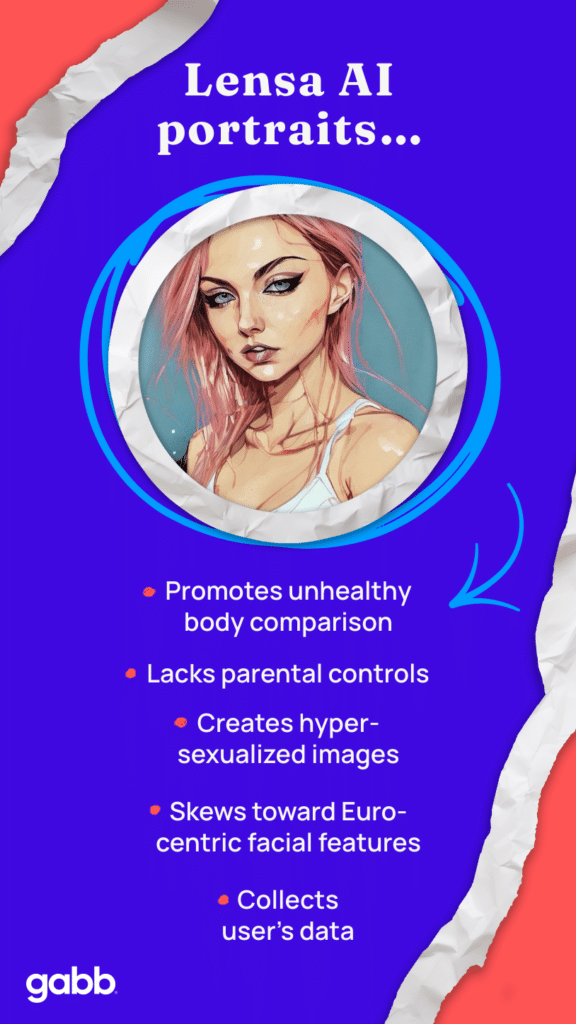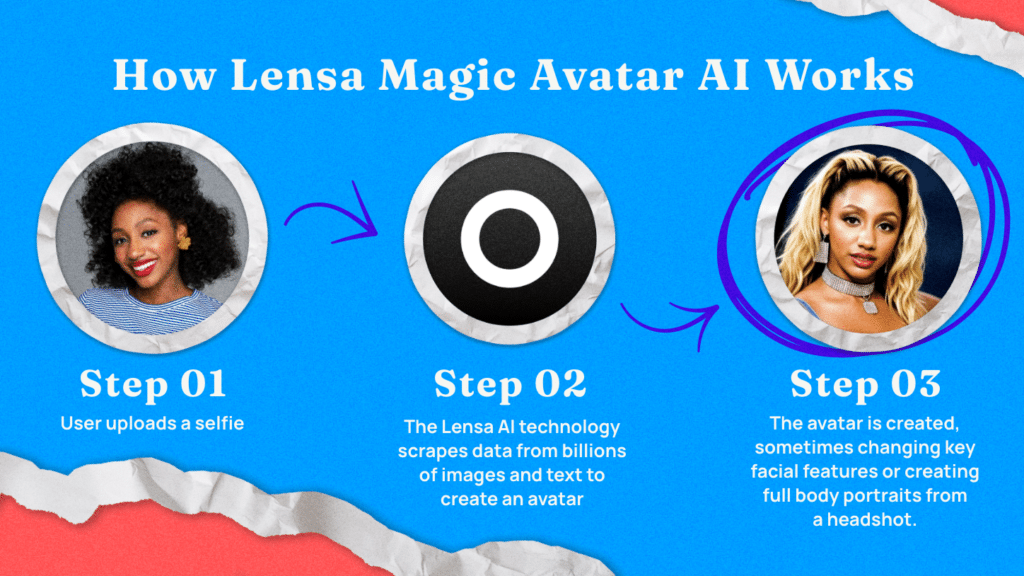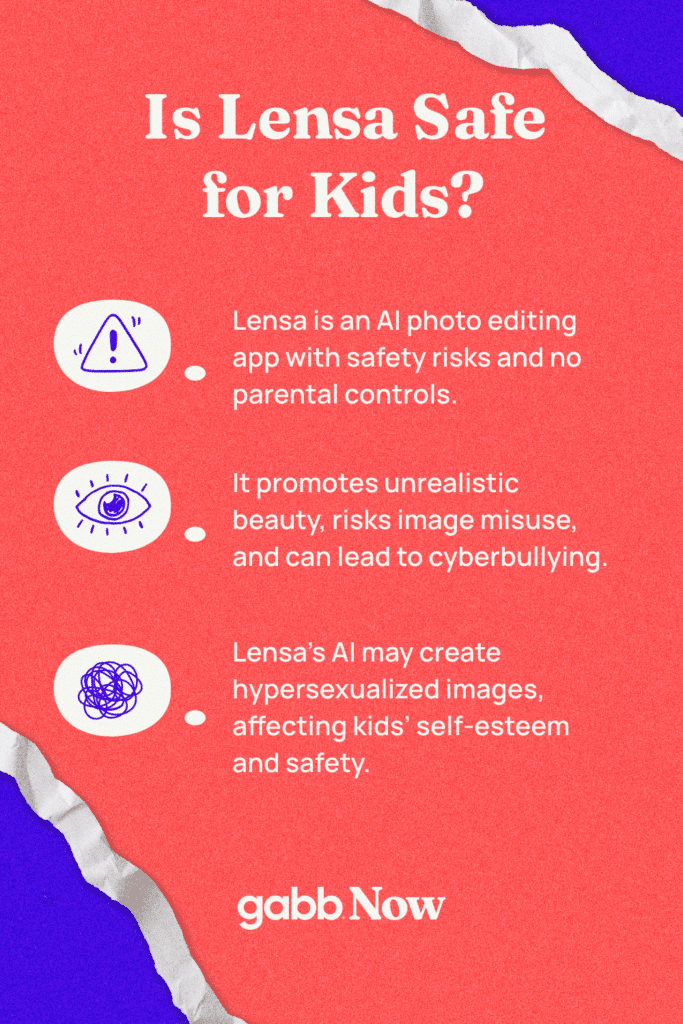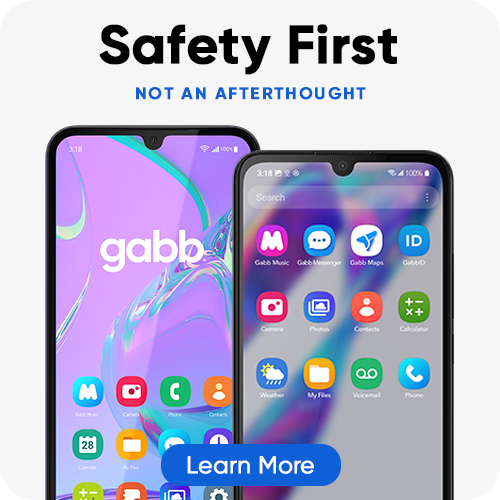Lensa touts itself as a photo editing app that can make “every photo perfect 365 days a year.” The basic application can be a useful tool for retouching images. However, its Magic Avatar feature can do far more, with potential risk to kids.
What is Lensa?
Lensa is an AI-powered photo-editing app that allows users to enhance and transform their images with filters, retouching tools, and, most notably, AI-generated portraits. Known for its ability to create realistic edits and artistic effects, Lensa uses advanced artificial intelligence to analyze and modify facial features, skin tone, and background elements.

The app has gained popularity among teens and adults alike for its fun, creative capabilities — but it also comes with privacy and safety concerns that parents should be aware of.
What is Lensa’s “Magic Avatar”?
In November 2022, Lensa introduced a feature called Magic Avatar, and encouraged users to update their profiles, with the promise that artificial intelligence (AI) would generate stunning avatars tailored to their identity and a variety of artistic styles.
What can be concerning to parents are the risks using this app poses, from the hyper-sexualization of images, the reinforcement of unattainable beauty standards, the replacement of features of people of color with Western-centric features, and the lack of privacy protection.
How Does Lensa Work?
The Lensa app is available for free download on the App Store and Google Play Store. The free version allows users to edit images by cropping, adjusting light, adding filters, erasing an object, and even changing the background. One edited image can be saved per day.

A year-long subscription to the Pro version costs $39.99 and allows users to save an unlimited amount of edited images, use advanced photo tools, and create 2000 Magic Avatars. Other plans cost $9.99 per month for 350 avatars, or $4.99 per week for 100 avatars.
Lensa’s Image Submission Instructions
Instructions for Magic Avatar photo submission describe how users have the best chance at receiving avatars they will like.
Lensa asks users to submit selfies that are:
- Taken close-up
- Using a variety of angles
- Have a variety of facial expressions
They cite “Bad photo examples” as:
- Group shots
- Full-length
- Kids
- Covered faces
- Animals
- Monotonous pics
- Nudes
Sadly, the results are not always what users hope for.
Does Lensa Have Parental Controls?
Lensa does not have parental controls. Although the terms and conditions state that the app is not intended for children and advises adults to refrain from editing images of kids, the age recommendation for the Lensa app is rated E for Everyone. There is no age-verification in place.

Given what has been reported about the potential for hyper-sexualized avatars, the diluting of ethnic features, and the slimming of bodies, certainly this app poses safety risks to children. We’ll go more into depth on these risks below.
User Complaints About Lensa
Lensa uses AI that has gathered and processed billions of images, artwork, and text from databases and the open web to “learn” how to generate these avatars, that in theory should resemble the images submitted by users, albeit in stylized ways.
However, the AI doesn’t consistently produce representations of the user’s selfies. In fact, many users share that the app consistently generates hypersexualized, misogynistic avatars that may also replace ethnicity with Western European features.
Lensa Creates Nude and Hypersexualized Images
It is highly concerning that in the first few weeks since the Magic Avatar update was released, women who have used the app have raised concerns that although they submitted fully-clothed selfies, the app has generated artwork that depicts them as topless.
While fewer reports have emerged recently, Primsa Labs CEO Andry Usoltsev has only declined responsibility by saying “The creators acknowldege the possiblity of societal biases. So do we.”
Women who have used the app raise concerns that although they submitted fully-clothed selfies, the app has generated artwork that depicts implied or fully nude images.
Assistant Professor of Computer Science & Engineering at the University of Washington, Aylin Caliskan, explains how the AI used to power Lensa’s Magic Avatars may promote racial bias and misogyny.
The avatars are created from billions of pictures and text scraped from the internet, and “ . . . because the internet is overflowing with images of naked or barely dressed women, and pictures reflecting sexist, racist stereotypes, the data set is also skewed toward these kinds of images.”
Lensa Has Created Nudes From Fully-Clothed Images
Writers for The Guardian news outlet based in London shared that after uploading 10 fully clothed, Lensa delivered two nude avatars. One was topless from the waist up, and the other showed nipples through a wet t-shirt.
Many of the images produced by Lensa resemble soft pornography or leave little to the imagination. Using AI to create pornography is currently such a significant issue that the UK is trying to change its Online Safety Bill to include the sharing of AI pornography without consent as a crime.
The Magic Avatar Alters Ethnicity
Racist stereotypes are overlooked by AI. Users of color have complained that their Lensa images are Anglicized. Many have noticed lighter skin tones, thinner noses, and light colored eyes.d. Many have noticed lighter skin tones, thinner noses, and light colored eyes.

Asian users in particular have called out Lensa for being racist. Xandra van Wijk spoke out on X, saying “Some of the results are borderline racist [be]cause it just served me random Asian girls that looked like the source material wasn’t adjust[ed] at all as if we all look the same.”
5 Major Safety Risks of Lensa
Lensa comes with some serious safety risks that parents and users should know about. These risks include promoting unrealistic beauty standards, potential misuse of images for revenge porn, risks of sexting and cyberbullying, dangers related to child exploitation, and concerns about data privacy.
1. Unattainable Beauty Standards
The Lensa App itself may promote the damage that comes from unattainable beauty standards, promising perfect photos. The Magic Avatar feature creates even more flawless images, and uses AI that seems to devolve a portion of the selfies of women and girls by creating avatars that are provocative and thin.

Plastic surgeons have received calls from prospective patients requesting to look like their AI avatar. Dr. Terry Dubrow warns that these expectations are not only unrealistic, they are also impossible.
An advocate for loving one’s self and body, Aubrey Gordon, shares her experience using Lensa to create avatars: “Lensa is really working overtime to make “AI” me into a thin person . . . What a bummer/what a bore.”
2. Revenge Porn
Lensa does not ask for verification that an image uploaded to their app is the user’s own, opening a gateway for users to exploit others without their knowledge. Once an avatar is generated, the user can save that file and use it wherever they want.
There have been concerns that the avatars created by non-users have already been used in “revenge porn”.

AI images magnify the possibilities for the creation of non-consensual pornography the sharing of intimate content publicly to harm a person’s reputation. With Lensa, sensual images can be completely fabricated through AI.
Vengeful ex-partners can upload a photo of their past love, find the most provocative AI avatar, and share it in an attempt to hurt their former partner’s reputation.
What Are Fake Nudes?
Fake nudes are fabricated disrobed photographs or artwork made to look like a real person, such as a celebrity. With accusations of Lensa producing underdressed and nude images from headshots, fake nudes may be a possibility.
What Are Deep Fakes?
While the magic avatar creates art, some are realistic enough to be classified as deepfakes.
3. Sexting and Cyberbullying On Lensa
Sexting is a common activity among today’s teenagers, and AI portraits can proliferate more ways to engage in these unhealthy activities by creating sensual images teens share with other peers or predators online.
Adolescents could impulsively input a peer’s image into the app and share the results with classmates, impacting that child and possibly creating legal implications for themselves.
4. Child Sexual Exploitation
Lensa is being accused of generating child sexual exploitation images.
While the app asks users to not upload images of children, there are no barriers to prevent it. Users have shared stories of uploading childhood images and being subsequently shocked at the avatars they received — adult bodies in sensual poses with childish faces.
5. Data Privacy Concerns
Lensa collects a range of data, including usage habits, device information, location, IP address, and cookies, which it shares with third-party apps for analysis. While the company states that user photos are stored only for 24 hours after image processing and then deleted, cybersecurity experts like Andrew Couts warn that without external audits, there’s no way to confirm whether photos are truly removed from their systems.
Additionally, Lensa’s AI technology “learns” from each image it processes to improve future facial depictions, raising concerns about the long-term implications of this data training. As AI-powered apps continue to refine their accuracy with each image, it’s crucial for users to weigh the potential security risks of sharing personal photos on such platforms.
Is Lensa Safe for Kids?
The Magic Avatar feature on the Lensa app is not safe for kids.
The Magic Avatar feature uses AI called Stable Diffusion, which literally scrapes data from all parts of the web’s barrel, even the bottom of it. By using this model, explicit and Euro-centric images will dominate, with women and girls being more vulnerable to receiving avatars that promote body image dissatisfaction and a decreased value of the beauty of people of color.

The Surgeon General of the United States issued an advisory on Youth Mental Health in December of 2021 warning that young people are in crisis, with an increase of 40% of adolescents expressing persistent feelings of hopelessness compared to just over a decade ago.
New studies emerge every week that link social media’s negative impact on wellbeing. In fact, Meta’s internal studies found that ⅓ of teen girls who feel bad about their bodies feel worse when they use Instagram.
Lensa’s avatars may contribute to the comparison trap kids using social media often fall into.
Join the Conversation
As AI photo-editing apps like Lensa continue to grow in popularity, it’s more important than ever for parents to stay informed about their potential risks. Balancing technology’s creative appeal with safety concerns can be challenging, but open conversations and awareness can help protect kids online.

Have you talked with your kids about apps like Lensa and the importance of digital privacy? Share your thoughts and tips in the comments.










Success!
Your comment has been submitted for review! We will notify you when it has been approved and posted!
Thank you!